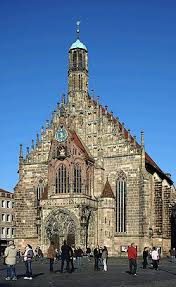JL
Memorial
They strolled down the street hand
in hand, almost protectively, examining the grey stone buildings lining both
sides of the thoroughfare. Window boxes,
containing what remained of the red and yellow blooms of a few months ago,
occasionally punctuated the street’s otherwise austere aspect. It was one of those mid-autumn days which one
could not fully trust because the chill of the coming winter could already be sensed
in the air. The breeze, although
pleasant enough on their cheeks, could no longer be considered a friendly one. The middle-aged couple sat down at one of
several worn tables, once painted in bright colors, which still remained
outdoors at a sidewalk cafe facing a stony and weed covered expanse across the
square. As they awaited the arrival of a
waiter to take their order, they were aware that they were the establishment’s
only customers.
When the elderly waiter,
incongruously wearing a heavy green sweater along with his black jacket, white
shirt and bow tie, asked for their order in German, the woman replied, “We prefer
not to speak German. Do you speak
English?”
“Most certainly, Madam. It is my pleasure to serve you. May I take your order now or would you prefer
a menu?”
“Just bring us two cups of coffee
and a piece of apple strudel, please.”
It was early November of 1956 and
most of downtown Nuremberg
had been rebuilt, after the destruction left by the Second World War. The spire of the Frauenkirche still dominated
that part of the city which lay within the often patched and rebuilt old walls dating
from the sixteenth century. As they
sipped their coffee and nibbled on the pastry, their thoughts went back to
another autumn day, eighteen years earlier, when they had similarly strolled
down these same streets, hand in hand.
They had just been married and since Jews were not readily granted
travel papers, even for more pressing matters than a honeymoon, they contented
themselves with the luxury of a walk through the town on a pleasant November day. They both wore yellow stars of David, loosely
sewn to their outer garments, and kept to the cobblestone street, since Jews
were not permitted to use the sidewalks.
Occasionally, a passing vehicle or wagon would splatter them from the
puddles remaining from the early morning rain.
“David, we shouldn’t stay out much
longer. We have been lucky thus far
today. No one has accosted us. I will always remember the pleasure of this
walk we are taking this morning on the day of our wedding, but I think it would
be wisest to return to the ghetto. It is
almost noon.”
“You are right,” the young man
answered, as he squeezed his bride’s hand leading her toward the warren of
narrow streets that started beyond the square alongside of the
Frauenkirche. “It would be foolish to
risk staying out here any longer.”
Since the latest anti-Semitic laws
had gone into effect, Jews were only allowed out of the Nuremberg ghetto during morning hours, unless
they had been granted a special pass. Violators of the edict were taken into
custody, and some were not heard from again.
When Rabbi Gluck had married them that morning, after the daily minyan
he conducted in his apartment, he had encouraged them to take a stroll into
town, enjoying a private moment as a newly married couple, but cautioned them
to be back in the ghetto as soon as possible.
After climbing the stairs to the
fourth floor at 23 Judengasse, where their families lived, David put his key in
the door and turned it. When he pushed
it open, he was met with unexpected darkness, although it was by then midday. Instinctively, he put his arm around his
bride, to protect her, but before they had another second in which to react,
the shades were suddenly raised and light filled the room. Voices cried out “Mazel Tov,” and in an
instant, what seemed like dozens of people were embracing, congratulating and
even kissing the couple. Glasses of wine
and slices of sponge cake were passed around and soon, the sounds of “Mazel Tov
and Simmin Tov, Simmin Tov and Mazel Tov” filled the small apartment.
“Thank you all. We shall never forget this day and our
friends here,” Dora said as the last of the guests, including their parents,
slipped out of the apartment, leaving David and his bride alone.
Before the month was out, the horrors
of Kristallnacht had occurred and the Nazis decreed that because the city of Nuremberg exemplified the
heart and soul of the Aryan Fatherland, no Jews whatsoever would be allowed to
remain there. The ghetto was to be
immediately vacated and destroyed and Jews living in Nuremberg would have to find living quarters
in the already crowded ghetto in Fuerth, about ten miles to the north.
Dora and David, along with their
families, made it to Fuerth, but thereafter, their circumstances rapidly spiraled
downward. Businesses and jobs were lost.
Families were separated and contact with relatives could not be
maintained. David ended up in a labor
battalion doing construction work in Bavaria. Dora, after having lost touch with her
parents, managed to find housing with a Jewish family in Fuerth, the
Kissingers, and after a few weeks, reluctantly accepted their offer to accompany
them, in the position of tutor for their fifteen year old son, Heinz, to the United States. Apparently, in 1938, the family still had
sufficient resources to enable them to flee the oncoming storm.
Dora remained in the United States
and whatever letters David managed to transmit became fewer and fewer. By 1941, with America at the brink of entering
the war, contact ceased entirely. After Germany
surrendered, Dora spent most of her time trying to locate her husband and
family. She had about given up all hope
until one day in 1946, there came a phone call from Italy. It was David.
Only he had survived.
“Would you like some more coffee?”
the waiter asked, looking at the couple more closely than he had
initially. “You are from here, aren’t
you?” he asked.
David nodded, but avoided saying
anything.
“And if I may ask you another
question, would I be too forward if I asked if you happen to be Jewish?”
This time it was Dora’s turn to nod
at the waiter, who by then was pouring coffee from a silver carafe into their
cups.
“The field across the way, that is
where the ghetto was,” he ventured, as if their tacit admission of their Jewishness
required him to point this out to them. “You can see that the street sign
reading ‘Judengasse’ has been restored.
The town council wants to put a plaque there, directly behind the church,
to memorialize the place. I am glad you
came back to see it. Very few do, and
most who come are with the Army. It is
so sad, what happened.”
“And where were you when it
happened?” David asked.
“I was in the Army, mostly in Africa and Russia,” the waiter replied.
“No,” Dora interjected. “Where when you before the fighting took
place in Africa and Russia, before they took you for the Army, when they were already
passing the laws against us, breaking our windows, taking our businesses and
property away from us, and mocking us on the streets. What were you doing then? But you don’t have to answer me. I know the answer. You were turning your head the other
way. All of you did. Because we were Jews. And when the killings started, it was already
too late for us, and for that matter, for you.”
David squeezed Dora’s hand as they
got up, leaving a few bills on the table.
They strolled, again hand in hand, across the square to the barren
expanse where they found the remnants of a stone stairway on which they sat
down. They saw the waiter, now seated at
the table they had just vacated, holding his head in his hands. The bells of the Frauenkirche began to ring
slowly, resonating over the area where the ghetto had once stood, as the couple
rose and recited the Kaddish, the memorial prayer for the departed.

Frauenkirche in Nuremberg, Germany,
near site of the former Jewish ghetto
Frauenkirche in Nuremberg, Germany,
near site of the former Jewish ghetto
In 1956, I was stationed at an Army base
about twenty miles north of Nuremberg. I frequently visited that city, including its
famous Frauenkirche and the area around it.
The 'Judengasse’ (Jew Alley) was a street very near that church, and
probably where any ghetto in Nuremberg
would have been. I also occasionally passed through Nuremberg’s northern
suburb of Fuerth, from which Henry Kissinger indeed did emigrate to the United States
in 1938 with his family. Regretfully,
these things did not mean as much to me in 1956 as they do now because at that
time, although we knew of it, the enormity of the tragedy of the Holocaust had
not yet made its full impact on many American Jews, including myself. While the rest of the story is indeed fiction,
it is also in a sense a kind of atonement for what I did not feel nor do
forty-six years ago in Nuremberg,
where experiences of people like David and Dora indeed did take place.

Jack
Lippman
2002
2002
A New Plan for
Retirement
There
may have to be a new paradigm for retirement in this country. Traditionally, retirement has been paid for
by pension plans which provide income after the retiree stops working or by
disciplined savings and investing to acquire sufficient funds on which to
retire.

Some have acquired retirement funds by selling their business or by selling a paid-for home if it happens to be in a desirable area, but these “windfall” approaches cannot be counted on to bear fruit at the right time and should not be substitutes for careful pension, savings and investment planning. Social Security alone provides retirement income at a bare minimum level and is only a minor part of retirement planning.
Some have acquired retirement funds by selling their business or by selling a paid-for home if it happens to be in a desirable area, but these “windfall” approaches cannot be counted on to bear fruit at the right time and should not be substitutes for careful pension, savings and investment planning. Social Security alone provides retirement income at a bare minimum level and is only a minor part of retirement planning.
That’s
the way it has been. But it ain’t that
way anymore. The generous pension plans
offered by government, educational systems, corporations and other businesses
have become history because of their cost.
In addition, the days of employment by one or two firms during a working
career are gone too. Even if one’s employer has a good plan, few employees
remain with an employer these days long enough to be vested in such a
plan. Add to this the fact that nowadays,
employers, even one’s own business, cannot be counted on to remain in existence
forever, either.
Recognizing
these realities, people should be planning to save and invest to retire by
participating in their own plan, sometimes with employer contributions, often
without them. 401K, Keogh and IRA plans
enable money to be saved, tax-deferred, until retirement. Traditional
investments are also available for this purpose. The problem is, unfortunately,
that in many, if not most instances, not enough
money is being saved to provide the kind of retirement income which the
old-fashioned pension plans mentioned above provided. And
unemployment, home purchases and children’s college tuition have even caused
many to dip into, and often exhaust, the funds they have put into these plans.
What
is the answer? With inadequate savings
for retirement looming as the future rule, rather than the exception, for many
middle and upper class people, a new paradigm for retirement may be on the
horizon. Well, it really isn’t new. In fact, it is old and existed before the
retirement planning mentioned in the first paragraph became common.
It
entails moving in with one’s still-employed children. The next few generations may spend their
retirement years on the front porches of their childrens’ homes, which of
necessity, will have an extra bedroom or two.
While inadequate for traditional retirement choices, what income these
retirees have will suffice for occasional vacations and luxuries. At least visiting grandchildren will be a
short trip, like up a flight of stairs.

This
new retirement pattern will be part of the general austerity which the entire
nation will be experiencing as efforts are made over the next several decades
to balance the amount of money the government spends with the amount of revenue
it receives and the amount it borrows at the same time as it tries to establish
an attainable debt reduction program.
This
is happening in Europe right now and I feel it is unavoidable in this country
as well. Like it or not, we are part of
a global economy which is subject to more than just our historic domestic
influences. But the next few generations might find it to be nice and
cozy sitting on a glider with a pitcher of lemonade on the table beside you on
the shady porch in that big house with three generations of your family
surrounding you. Some of you may already
be able to feel the breeze.

Jack Lippman

Most readers of this blog are alerted by Email every time a new posting appears. If you wish to be added to that Email list, just let me know by contacting me at Riart1@aol.com.
Also, be aware that www.Jackspotpourri.com is now available on your mobile devices in a modified, easy-to-read, format.
Our family of web sites includes: www.computerdrek.com - www.politicaldrek.com - www.sportsdrek.com - www.healthdrek.com.
Check all of them out, find out what “drek” really means and feel free to submit your thoughts and articles for publication on these sites, which, while still “under construction,” already contain some interesting content.
Additional new material will continue to be posted on www.politicaldrek.com until the Presidential election. New material will resume being added to the other three “drek” sites after November of 2012.
Most readers of this blog are alerted by Email every time a new posting appears. If you wish to be added to that Email list, just let me know by contacting me at Riart1@aol.com.
Also, be aware that www.Jackspotpourri.com is now available on your mobile devices in a modified, easy-to-read, format.
Our family of web sites includes: www.computerdrek.com - www.politicaldrek.com - www.sportsdrek.com - www.healthdrek.com.
Check all of them out, find out what “drek” really means and feel free to submit your thoughts and articles for publication on these sites, which, while still “under construction,” already contain some interesting content.
Additional new material will continue to be posted on www.politicaldrek.com until the Presidential election. New material will resume being added to the other three “drek” sites after November of 2012.
Jack
Lippman
* * * * * *
* * *
To send this posting to a friend, or enemy for that matter, whom you
think might be
interested in it, just click on the envelope with the arrow on the
"Comments" line directly below.

No comments:
Post a Comment